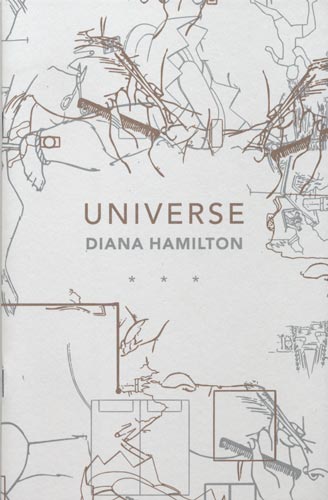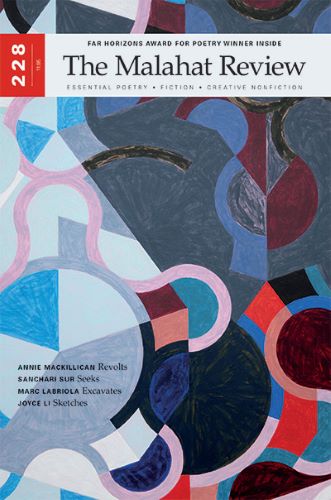Universe
Diana Hamilton’s Universe is one of the tightest projects I’ve ever read: a chapbook length poem on ethics, broken into two sections (one roughly on property/possession, the other on race) and comprised largely of analytical propositions angularly cut into strikingly short lines. “You and I exist in a civil condition” the speaker asserts. Doesn’t sound very exciting, does it? Diana Hamilton’s Universe is one of the tightest projects I’ve ever read: a chapbook length poem on ethics, broken into two sections (one roughly on property/possession, the other on race) and comprised largely of analytical propositions angularly cut into strikingly short lines. “You and I exist in a civil condition” the speaker asserts. Doesn’t sound very exciting, does it?
Oh, but this poem is exciting, for its sophistication and, especially, for its theatrical sensibility. One can’t help but read these propositions with a certain skepticism: that this all mimesis, and that the dry logic is in some way a kind of joke, maybe about philosophy, or maybe about poetry. The propositional language is well done—the syntax self-assured, commanding even:
If I wrong you,
innocently or culpably,
I wrong you in particular,
and you in particular
have a complaint against me.
And thus the speaker follows, in good philosophical form, a series of logical pathways that deepen and modify questions about the right to property and personhood, and later, about racial equality. These pathways are contained in short stanzas separated by asterisks, and it is in these separations that the real magic of the poem occurs. The poem is essentially a collection of analytical vignettes staged into kinds of dialogues, alternating between subjects with varying paces, which give the poem a global shape:
If I force you to work for me
I wrong you.
*In the same way, I wrong you
if I take something
that belongs to you.
*The bear-baiter does not really imagine
what it is like to be a bear.
If he did, he would think
and act differently.
*If the thing that I take is something you have made.
The theatrics of speech develop overtime through this interweaving of different lines of thought, through pauses, non-sequiturs, and interruptions. In this way, odd little things start to filter through and, eventually, accrete. There is this bit about sitting on a haystack, another about going to the store. There is a chess game, and this swift, nearly buried moment: “December: Winter commences. / Bills come pouring in. Trust yet to the stars.” The poem begins with a thought experiment about haircuts:
If you stop me
from cutting
your hair,
there is a sense
in whichyou are interfering.
*
But, since you are entitled
to determine
whether I cut your hair
or not, you do not
wrong me.
At first this haircut feels like a mere example, arbitrary, as it’s fairly quickly abandoned. But it keeps popping up, all the way through to the end of the poem, by which point it feels much more like a fetish or obsession (more on this in just a bit).
The speaker, in a way, cracks, seemingly under moral pressure and frustration, especially in the second section, which is devoted to race. This section begins by rehearsing the bunk inquiries of old-fashioned race science, which is so historically out of place that we can only be left to ask ourselves what the poem is setting up for us. It’s very sensitive material coldly (and bravely) rendered in this analytical phrasing. Here is a brief example:
As before, no criterion is stated
for determining whether an individual
member of some other race
is or is not
my ‘brother’
in the extended sense, or whether
he is or is not
a child of God.
Rest assured, the poem is indeed setting something up. Through a series of elaborations, the speaker works her way toward a sadistic fantasy of forcefully disproving the ideology of a hypothetical white supremacist while also violently cutting his hair, his “beautiful ponytail / in one hand / while the other / holds the scissors.” It’s a terrifyingly gratified moment, emotionally wrought, releasing frustrations for the speaker through its fully articulated realization, something the speaker does, in the end, feel guilt about: “In doing so, / you wrong him.”
The effect of all of this is a fascinating enactment of the tensions between rationality and fervor. While the actual moral problems here are ones we all seem to have solved—at least in theory—they find fresh use in this nuanced exploration of our deepest impulses and hesitations, of those moments when we feel ourselves get—and allow ourselves to be—angry, selfish, and dominating. One need only read the news about our polarized politics to see the same kinds of frustrations played out, or watch the continued success of films about slavery and other historical atrocities to know that these kinds of problems never leave our psyche. At least we have small, unassuming chapbooks such as this to help us continue to think through them.





